VOTER GUIDE
 On Tuesday, June 30, Faith in Public Life and Interfaith Power & Light released a voter reflection guide endorsed by prominent national faith groups and religious leaders. The guide, Democracy, Values & the 2020 Election, addresses urgent issues in the election, including voting rights, climate change, systemic racism in the criminal justice system, healthcare and immigration. The guide, which will be distributed across the country for discussion in diverse faith communities, includes topics for reflection and sample questions to ask candidates Download Full Guide Here
On Tuesday, June 30, Faith in Public Life and Interfaith Power & Light released a voter reflection guide endorsed by prominent national faith groups and religious leaders. The guide, Democracy, Values & the 2020 Election, addresses urgent issues in the election, including voting rights, climate change, systemic racism in the criminal justice system, healthcare and immigration. The guide, which will be distributed across the country for discussion in diverse faith communities, includes topics for reflection and sample questions to ask candidates Download Full Guide Here
Download Spanish-language version of the guide, Democracia, Valores y las Elecciones de 2020
Issues and Questions
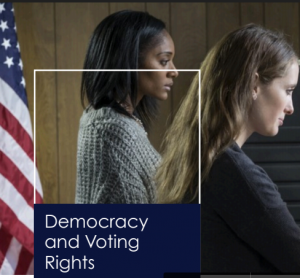 Democracy and Voting Rights (Page 1)
Democracy and Voting Rights (Page 1)
This election is more than a choice between parties and ideologies. An even more fundamental question is at stake: Can we preserve democracy in the face of serious threats to fair elections and fundamental rights?
Questions for Reflection and Candidates
- How do you see democratic values at risk today?
- How do systemic barriers to voting undermine our most sacred democratic values?
- How can your faith community better advocate for stronger voter protections at the state and local level?
- As a candidate, what are your specific plans for protecting and strengthening voting rights?
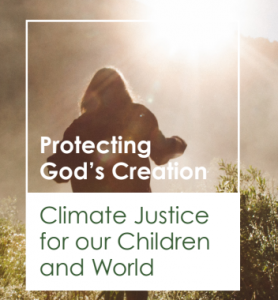 Protecting God’s Creation Climate Justice for our Children and World (Page 2)
Protecting God’s Creation Climate Justice for our Children and World (Page 2)
As people of faith, we believe that responding to the urgent threat of climate change is essential to caring for God’s creation and loving our neighbors. Human activity, primarily the burning of fossil fuels for energy, has thrown
nature out of balance, polluted the air, driven thousands of species of God’s creatures to extinction, intensified catastrophic events such as wildfires and hurricanes, and threatened the lives and livelihoods of our most vulnerable brothers, sisters and neighbors around the world. Scientists tell us we have less than a decade to avoid even more catastrophic consequences.
The United States has a unique responsibility to show moral and political leadership:
- Transitioning our economy away from polluting fossil fuels toward 100% clean energy.
- Honoring the emissions-reduction commitments our nation made at the UN Conference on Climate Change in Paris in 2015, and taking additional actions needed to avert catastrophic global warming.
- Assisting developing nations— who are least responsible for climate change but most impacted by it — in coping with threats such as increased droughts, disease, and sea-level rise by sharing technology and financial support.
Questions for Reflection and Candidates
- What does your faith teach about our responsibilities for the Earth and to others? How are they interdependent?
- Has your faith community made an effort to cut emissions, save energy, or practice environmental stewardship?
- As a candidate, what specific policies do you support to protect God’s Creation and secure a safe climate for our children and future generations?
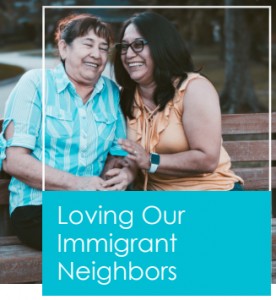 Loving Our Immigrant Neighbors (Page 4)
Loving Our Immigrant Neighbors (Page 4)
Scripture repeatedly makes clear that immigrants must be treated with dignity. Policies that rip children from their parents’ arms, lock people away in inhumane conditions, and ban desperate families from entering the country
should keep us awake at night. As people of faith, we believe that the way we treat our immigrant neighbors is a sign of how we treat God.
Questions for Reflection and Candidates
- How can we replace immoral immigration policies that tear families apart and cause trauma with an immigration system that values families and affirms the dignity of allv people?
- What can we do to heal the wounds inflicted on immigrant communities by political rhetoric that portrays them as a dangerous “other?”
- If there are immigrants in our community who are feeling isolated and under threat, how can we show support and build connections?
- As a candidate, what will you do to defend the dignity of all immigrants, and how will you further policies that keep families together?
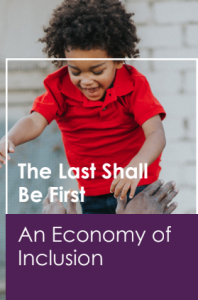 The Last Shall Be First An Economy of Inclusion (Page 5)
The Last Shall Be First An Economy of Inclusion (Page 5)
Our economic systems should work for all Americans, not only the wealthiest few. This is a matter of justice and
human dignity. All religious traditions recognize that charity is essential to care for the most vulnerable, but helping our neighbors in poverty also compels us to address its root causes. “Charity is no substitute for justice withheld,” St. Augustine observed centuries ago.
Questions for Reflection and Candidates
- What can we do to ensure that all Americans are able to provide for their families and live with security and dignity?
- How do we create a just tax system that is fair to all Americans, including working families who are trapped in poverty?
- Why does the United States lag behind most developed countries when it comes to providing paid sick leave and paid family leave?
- As a candidate, what are your specific plans to ensure workers have living wages and economic security while the coronavirus pandemic continues, as well as for the long term?
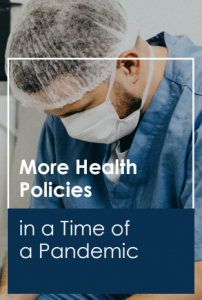 More Health Policies in a Time of a Pandemic (Page 7)
More Health Policies in a Time of a Pandemic (Page 7)
Despite our nation’s stated values of life and equality, the United States is the only industrialized country in the world that does not guarantee its residents universal access to health care. This is a failure of political and moral imagination – especially in a time of pandemic.
Questions for Reflection and Candidates
- How can people of faith be most effective in using our stories, congregations and power to advocate for health care reform?
- What do you struggle with the most when it comes to our healthcare system?
- How has the COVID-19 crisis impacted your community? What policy solutions can keep us all safe and remedy racial and economic inequalities in your community?
- As a candidate, what are your specific plans for making sure that quality,
affordable health care is available for all?
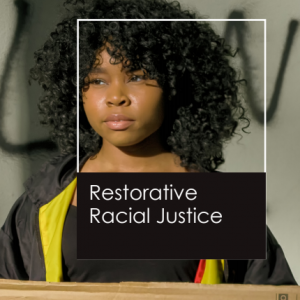 Restorative Racial Justice (Page 9)
Restorative Racial Justice (Page 9)
Justice and redemption are at the very heart of faith. Restorative justice begins with listening to and empowering communities that have been exploited, excluded and denied equal representation and freedom. The evil ideology of
white supremacy shaped our nation from its founding and continues to impact policies and communities today, especially in the criminal justice system. The killings of Ahmaud Arbery, Breonna Taylor, George Floyd and so many other Black people, Indigenous people, and other people of color, has provoked a growing, multi-racial moral movement for accountability and systemic reforms for racial justice.
Questions for Reflection and Candidates
- How can we dismantle the evil ideology of white supremacy in our culture and political systems?
- What can be done to end racial profiling and police violence against people of color?
- What steps can be taken to ensure formerly incarcerated people have voting rights and fair access to employment?
- As a candidate, what will you do to ensure racial justice is prioritized in the criminal justice system?
- How do we build safe communities for everyone, particularly people of color?
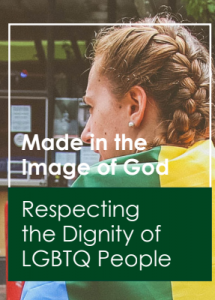 Made in the Image of God: Respecting the Dignity of LGBTQ People (Page 11)
Made in the Image of God: Respecting the Dignity of LGBTQ People (Page 11)
All people have inherent dignity because everyone is created in the image of God. Our gay, lesbian, bisexual and transgender family members, neighbors and co-workers deserve equal rights, and to live without fear or discrimination.
Questions for Reflection and Candidates
- How can your faith community more fully support the equal dignity of LGBTQ people in your state and local area?
- What are the greatest threats to LGBTQ people in your community and the nation?
- As a candidate, what are your specific plans to ensure that LGBTQ people have equal rights and are treated with dignity
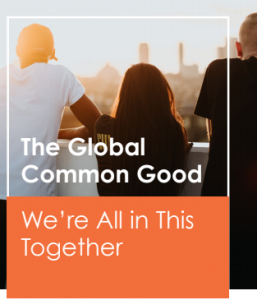 The Global Common Good: We’re All in This Together (Page 12)
The Global Common Good: We’re All in This Together (Page 12)
What does it mean to love our neighbors as ourselves in a globalized world? The health and future of our country and
communities are interconnected to the health and security of other nations. Our fates are bound up in what Rev. Martin Luther King, Jr., called “an inescapable network of mutuality.”
Questions for Reflection and Candidates
- What policies do you think are most important for creating security for your family and community?
- What role should the United States play in the world to help build global peace and security?
- How can your faith community advocate for policies to create a more peaceful world?
- As a candidate, what programs and policies would you prioritize to help build secure communities and a peaceful world?

Testimony on State Methane Rules: Jack Edwards
/in Faithful Citizenship, Featured Articles, NEWS, Permian Basin /by adminMembers and supporters of New Mexico Interfaith Power & Light have prepared testimony for hearings held by the Environmental Improvement Board. The hearings, held the week of Sept. 20-24, are in support of the The New Mexico Environment Department’s (NMED) strong proposal to cut ozone-forming volatile organic compounds (VOCs) and methane released by the oil and gas industry.
.
Lake Powell and lake Mead are currently at one third of their capacity and close to the point where they can no longer produce hydro electric power. Irrigators on the Sacramento river have for the first time been told to stop diverting water. (1) A pall of smoke hangs over the west. Globally world populations are forced to migrate creating political chaos. Are these things connected?
.
I am here to encourage the NMEIB to enact stronger rules to prevent fugitive methane releases. The purpose of this is to prevent the increasingly large buildup of greenhouse gases and the worsening of the global warning. I think anyone who is able to connect more than two dots can understand this.
.
“The latest August 2021 report by the Intergovernmental Panel on Climate Change (IPCC) identifies methane as one of the worst greenhouse gases contributing to climate change.” (1)
.
One of the more profound effects of methane releases is what is called the “Methane Accelerator”. As the climate warms many new sources of currently sequestered methane are activated including releases from thawing permafrost and marine hydrates from warming oceans.
.
So if methane is such a potent contributor to global warming why not eliminate the controllable releases. As they said in the movie “Show me the money.”
.
I will leave you with one more closing thought. Throughout the southwest one of the most frequently found ancestral puebloan structures are granaries built of tightly mortared stone and mud and built in high and inaccessible cliffs. What did they know that we seem to be forgetting. They knew it is vital to protect their seeds for the future. Wouldn’t it be nice if we New Mexicans, with our rich cultural backgrounds and our special climate vulnerability, could be a leader in controlling fugitive methane emissions.
.
1.) Rinaldo Brutoco, The “Methane Accelerator” Climate Change is Moving Past The Tipping Point, the Montecito Journal, September 21, 2021.
.
Testimony on State Methane Rules: Marlene Perrotte
/in Faithful Citizenship, Featured Articles, NEWS, NMIPL in the News, Permian Basin /by adminDear Members of the Environmental Improvement Board,
I am _Marlene Perrotte, a Sister of Mercy and member of NM Interfaith Power and Light. I am writing today to encourage the EIB to vote to support and strengthen the New Mexico Environment Department’s draft rule to address Ozone Precursor Pollutants from oil and gas operations. These are ethical issues that demands protection of the Common Good.
This rule is critical for protecting both our health and climate by reducing smog-forming volatile organic compounds as well as methane – a powerful greenhouse gas responsible for 25 percent of the climate change we are experiencing today.
While the Environment Department has put forward a strong proposal, more work needs to be done to protect communities and address major pollution sources to meet Gov. Lujan Grisham’s goal of nation-leading rules to cut pollution. It is critical to include adequate funding for inspection, implementation of violations corrections and fines.
Please adopt a strong final rule that protects communities and addresses major sources of air and climate pollution.
Thank you,
Sr. Marlene Perrotte
Testimony on State Methane Rules: Joan Brown, OSF
/in Faithful Citizenship, Featured Articles, NEWS, NMIPL in the News, Permian Basin /by adminEIB methane hearing
Good Afternoon and thank you hearing officer and board for taking public comments on this important methane pollution rule.
My name is Joan Brown, a Franciscan Sister and Executive Director of NM IPL. NM IPL works with faith communities and people of faith and conscience all over the state to reflect, pray and act on concerns of community, health and environment as it relates to climate justice.
We learned about methane concerns some 10 years ago and have educated our thousands of members and faith leaders and offered 100s of comments as part of the process to regulate methane. We have worked with faith leaders in SE New Mexico and have been in homes of ordinary people who are concerned about the smells and voc’s. On one occasion I visited with women, mothers in a lower income neighborhood who did not understand the terrible odors coming into their house. When we went into the field near their backyard we witnessed methane pollution with powerful cameras. Going back on another occasion, we witnessed pollution months later. But, those affected do not often speak up because they are afraid of repercussions by those of power in our communities. Methane pollution is an environmental, economic and racial justice concern that needs attention and strong rules with recommendations to strengthen them is vital.
It is immoral and unethical to continue with business practices that disregard God’s creation and our communities. The only commandment that we are given from all religious traditions is to Love our neighbor and creation. Disrespect of health, the environment and life that we are given to cherish is not acceptable and it is not ethical business.
Later this week I will submit a letter signed by nearly 100 faith leaders from around the state who share the concerns about health, justice and climate. The recent UN Intergovernmental Panel Climate Change report was called a “code red for humanity” by the UN Secretary-General António Guteres’. As faith leaders we understand that code red means we all must take urgent action to care for life and our sacred Common Home.
We have a choice to continue life sacrifice zones or live into our identity a True land of enchantment and a Common Home that respects the common good.